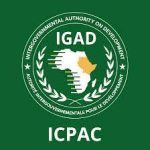Episode 6
“East Africa Hazards Watch is a very good example of how innovation, data visualization, automation, and collaboration can lead to better decisions, and support adaptation and resilience to climate change.”
-Erick otenyo, ICPAC
The UN IPCC’s late February publication Climate Change 2022: Impacts, Adaptation, and Vulnerability, looking specifically at the socioeconomic impacts of climate change, was described by UN Secretary General António Guterres as, “an atlas of human suffering and a damning indictment of failed climate leadership.” The report issued a strong call-to-action to lower emissions and mitigate climate change while recognizing the urgent need to ramp up funding streams for adaptive measures.
Taking a deeper look at the relationship between investing in climate data and building adaptive capacity, we are thrilled to welcome Abubakr Salih Babiker, Erick Otenyo, and Marta Baraibar from the IGAD Climate Prediction and Applications Center, also known as ICPAC for the first episode of our 2022 series of Data Points. Leveraging climate and environmental data from a number of sources including Berkeley Earth, their East Africa Hazards Watch platform serves as a crucial early warning system to help increase adaptive capacity in an 11-country region across eastern Africa.
In this episode we discuss:
????An overview of ICPAC and their impact as a climate services provider
????How a single extreme weather event accounted for a 14% loss of GDP for one East African country
????The strengthening of the Indian Ocean dipole and it’s impact on weather patterns across the continent
????How a tropical cyclone in the Saudi Arabian desert created an ongoing locust infestation across East Africa
????The importance of filling crucial climate data gaps to improve adaptive capacity
????The significance of science communications in reaching last mile users and improving outcomes
???? Want to support independent climate science? Leave us a review below! You can also subscribe to Data Points on your favorite podcast platform, and visit donate.berkeleyearth.org to make a tax deductible donation today.
Links to papers and resources mentioned in this episode:
???? IPCC Working Group II Report – Climate Change 2022: Impacts, Adaptation, and Vulnerability
???? Time is running out to avert a harrowing future, climate panel warns – New York Times
???? WMO Atlas of Mortality and Economic Losses from Weather, Climate and Water Extremes (1970–2019)
???? How extreme weather is – and is not – linked to the effects of climate change




